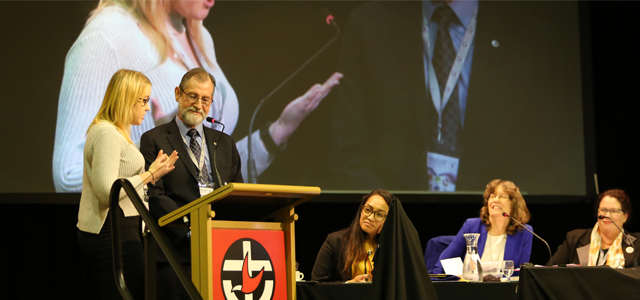In his report as retiring President of the Assembly, Stuart McMillan spoke about the importance of relationships and issued the Uniting Church in Australia a number of challenges.
On Monday Mr McMillan told the 15th Assembly meeting at Box Hill Town Hall in Melbourne that one of the most important things he had learnt from the First Peoples in the Northern Territory was their emphasis on the intrinsic value of relationship.
He said that the church fosters “relationships that have Christ’s love at the heart of them” or as the Scripture in Romans says “We belong to each other”.
“My heart burns brightly for the relationship we have in this culturally diverse community we call the Uniting Church,” Mr McMillan said.
Mr McMillan challenged listeners to take up the words in the first paragraph of the Basis of Union and be a church to the whole world, beyond even the focus on Asia, the Pacific and Africa.
He said that he believed the leading of the Spirit for the Uniting Church was to be a culturally diverse and reconciling community.
In his report as retiring President of the Assembly, Stuart McMillan spoke about the importance of relationships and issued the Uniting Church in Australia a number of challenges.
On Monday Mr McMillan told the 15th Assembly meeting at Box Hill Town Hall in Melbourne that one of the most important things he had learnt from the First Peoples in the Northern Territory was their emphasis on the intrinsic value of relationship.
He said that the church fosters “relationships that have Christ’s love at the heart of them” or as the Scripture in Romans says “We belong to each other”.
“My heart burns brightly for the relationship we have in this culturally diverse community we call the Uniting Church.”
Mr McMillan challenged listeners to take up the words in the first paragraph of the Basis of Union and be a church to the whole world, beyond even the focus on Asia, the Pacific and Africa.
He said that he believed the leading of the Spirit for the Uniting Church was to be a culturally diverse and reconciling community.
A large part of that was continuing to learn from First Peoples and journey in Covenant with them towards a recognition of sovereignty.
First Peoples were still suffering a huge rate of family separation, imprisonment and living under the failed imposition of the Intervention, Mr McMillan said.
Mr McMillan called those things “blights on our common humanity.”
“Our call is to continue to shine a light on those injustices,” Mr McMillan said.
“It is my hope that we again give moral leadership to the nation.”
Mr McMillan issued a personal apology to First Peoples for past instances of cultural dominance, such as when Indigenous candidates were refused ministry for having more than one wife.
He also revealed that the Mapoon Appeal, a project he has very much championed during his three-year presidency, has raised $730,000 to build a church for the Indigenous faith community in Cape York.
Another challenge that faced the church, Mr McMillan said, was US research that demonstrated that as they age, many young Chinese and Korean Christians abandon the faith .
He said this should stop the Uniting Church from being complacent and that young leaders needed to be “nurtured, mentored and empowered”.
Mr McMillan thanked a number of Assembly staff but gave special recognition to General Secretary Colleen Geyer who he said had helped provide a model of collaborative leadership.
Standing Committee member Bethany Broadstock proposed a minute of appreciation for Mr McMillan’s service.
The Uniting Church had been “well-served, well-loved and well-represented” by Mr McMillan, Ms Broadstock said.
She said Mr McMillan’s presidency had been characterised by a deeply relational and pastoral approach.
An enduring hallmark of his term had been the priority in reconciling with the First Peoples.
“He reminds us an authentically Australian Christian movement is to put First Peoples at the heart of its being,” she said.
Ms Broadstock said as that as a church representative, Mr McMillan had “spoken on our behalf with clarity and grace”.
“We were well served by the open and humble way he engaged with the work of the Royal Commission,” she said.
The Uniting Church has been immensely privileged by Mr McMillan’s empowering leadership, Ms Broadstock said.
President Deidre Palmer invited Mr McMillan’s wife Ros to the stage to accept a gift as the Assembly approved the minute of appreciation by consensus and a standing ovation.
A large part of that was continuing to learn from First Peoples and journey in Covenant with them towards a recognition of sovereignty.
First Peoples were still suffering a huge rate of family separation, imprisonment and living under the failed imposition of the Intervention, Mr McMillan said.
Mr McMillan called those things “blights on our common humanity.”
“Our call is to continue to shine a light on those injustices,” Mr McMillan said.
“It is my hope that we again give moral leadership to the nation.”
Mr McMillan issued a personal apology to First Peoples for past instances of cultural dominance, such as when Indigenous candidates were refused ministry for having more than one wife.
He also revealed that the Mapoon Appeal, a project he has very much championed during his three-year presidency, has raised $730,000 to build a church for the Indigenous faith community in Cape York.
Another challenge that faced the church, Mr McMillan said, was US research that demonstrated that as they age, many young Chinese and Korean Christians abandon the faith .
He said this should stop the Uniting Church from being complacent and that young leaders needed to be “nurtured, mentored and empowered”.
Mr McMillan thanked a number of Assembly staff but gave special recognition to General Secretary Colleen Geyer who he said had helped provide a model of collaborative leadership.
Standing Committee member Bethany Broadstock proposed a minute of appreciation for Mr McMillan’s service.
The Uniting Church had been “well-served, well-loved and well-represented” by Mr McMillan, Ms Broadstock said.
She said Mr McMillan’s presidency had been characterised by a deeply relational and pastoral approach.
An enduring hallmark of his term had been the priority in reconciling with the First Peoples.
“He reminds us an authentically Australian Christian movement is to put First Peoples at the heart of its being,” she said.
Ms Broadstock said as that as a church representative, Mr McMillan had “spoken on our behalf with clarity and grace”.
“We were well served by the open and humble way he engaged with the work of the Royal Commission,” she said.
The Uniting Church has been immensely privileged by Mr McMillan’s empowering leadership, Ms Broadstock said.
President Deidre Palmer invited Mr McMillan’s wife Ros to the stage to accept a gift as the Assembly approved the minute of appreciation by consensus and a standing ovation.
First published on the 15th Assembly website.






